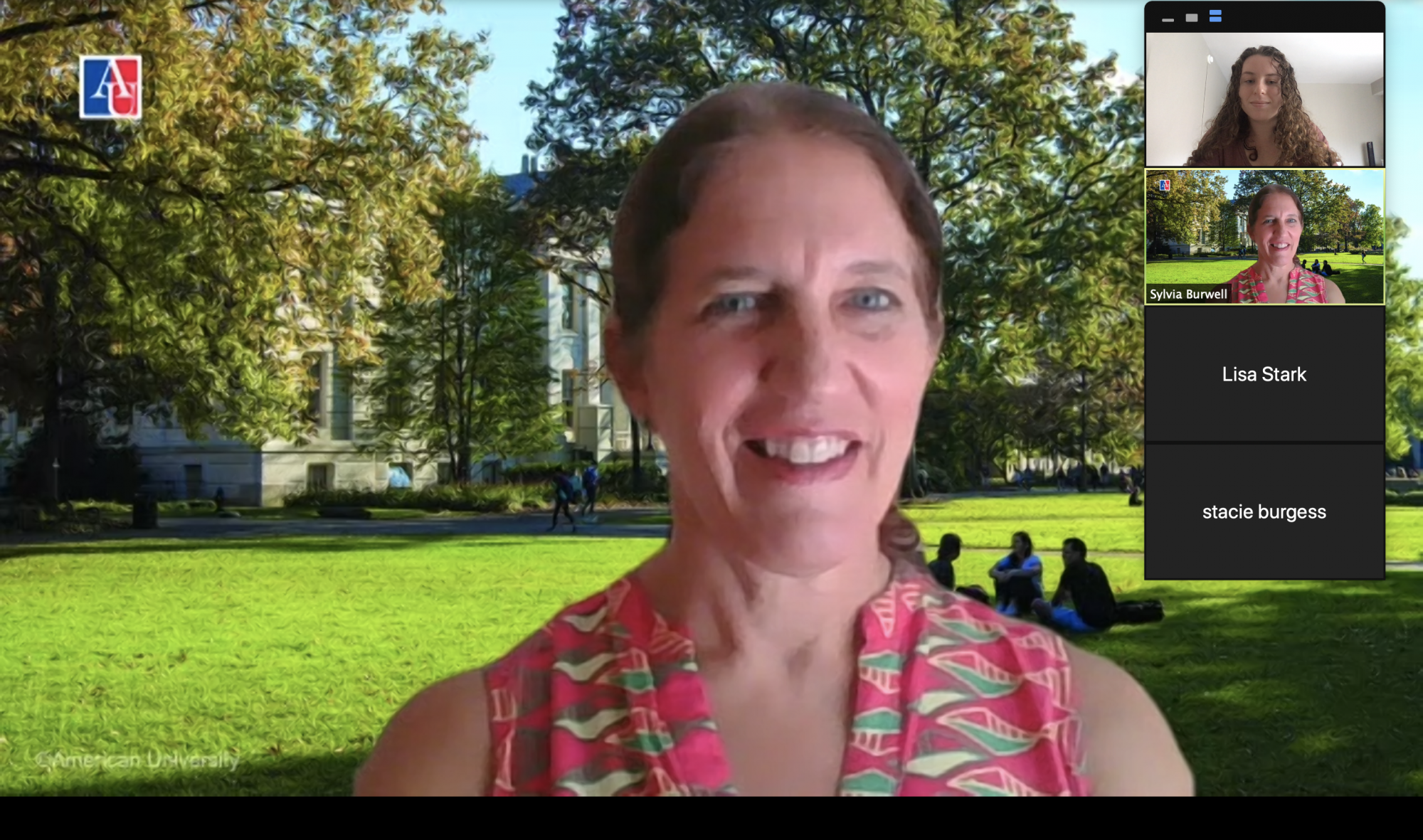Burwell draws on HHS experience at AU to deal with COVID-19
“Pandemic more challenging in a university setting,” Burwell says
President Sylvia Burwell meets for a virtual interview with The Eagle.
Screenshot courtesy of Nina Heller
By Nina Heller | Sept. 17, 2020
After serving as U.S. secretary of Health and Human Services under the Obama administration, President Sylvia Burwell came to American University not knowing she would have to lead a response to another major health crisis.
Due to the coronavirus pandemic, Burwell made the decision to transition classes fully online in March, sending students who lived on campus home along with canceling study abroad programs. In July, a month and a half after publishing a hybrid plan for the fall semester, she announced that AU would remain online for the fall because of health and safety concerns.
“The challenges of this pandemic are challenges, no matter where you came from,” Burwell said, in a recent interview with The Eagle. “And they have to do with certain things that make the pandemic more challenging in a university setting.”
Despite leading the U.S. response to health crises, like the Ebola epidemic and Zika virus, Burwell does not have any formal academic experience in the public health field. Instead, she graduated with a bachelor’s degree in government from Harvard University and another in philosophy, politics and economics from the University of Oxford as a Rhodes Scholar.
Professor Melissa Hawkins, director of AU’s Public Health Scholars Program, said that Burwell’s previous experiences as HHS Secretary, the director of the Office of Management and Budget and a leader for the Bill and Melinda Gates Foundation have helped Burwell combine science and policy to make the right decision for AU.
“I think she's really been the right leader for AU at the right time because she understands the importance of the data and the science to drive the decisions. She's really relied on scientists and the science to help guide her decision making, too, and I think that that's been important in her decisions being informed by the best science at the time,” Hawkins said.
Burwell said that regardless of her background, leading an institution through a pandemic presents challenges. Some factors that complicate the situation include the behaviors of the student population, residential living, asymptomatic spread and “confusing messaging” about public health guidelines, she said.
Burwell said there were “fundamental changes” that adjusted AU’s decision on how it was going to conduct classes in the fall. These included an increase in cases across the country, limited testing capacity, other schools in the region deciding to go fully online and the implementation of D.C.’s two-week quarantine for students from high-risk states.
When she appeared on Face the Nation in August, Burwell called for a national testing strategy to be created in order for schools to be able to reopen. Hawkins agreed, saying that it is hard for universities to manage COVID-19 on their own.
“Universities are a microcosm of what we're seeing across the country, and really across the world, in terms of response and preparedness and resources to be able to carry out a comprehensive plan and approach [for testing],” Hawkins said.
Universities like the University of North Carolina at Chapel Hill have seen clusters of outbreaks since reopening for the fall semester. Burwell said that her decision to do online classes this semester was not based on the decisions of other universities to reopen, rather, she based her decision on science and facts.
“We’re learning from other institutions, that I want to do. That I watch and I learn. But with regard to our decisions, get the principles, get the facts and make decisions,” Burwell said.
While AU has only reported four cases of COVID-19 of members of the AU community who live in the D.C. area, Burwell said that having cases at AU is just a reality of the pandemic. At the time of the interview, AU had reported one case.
“We want to track our cases to make sure that you contain and do that you do that well. I think there are going to be cases everywhere,” Burwell said. “The pandemic is spread so deeply and there's so much community spread and I think people need to understand we're going to have cases. That is going to happen.”
Due to AU transitioning online, the University is projecting that it will lose $116 million for the 2021 fiscal year. This is largely due to a 10 percent tuition discount, lower enrollment, and the loss of revenue from housing and dining.
“We're basically tuition and fee dependent institutions, and any other sources of revenue mainly come from things like conferences and convenings,” Burwell said, “As well as the fact that our costs that can be considered fixed, our personnel costs are the largest portion of our costs, and faculty are needed, whatever mode we're doing.”
When asked about the students returning to campus in the spring, Burwell said AU will need to be able to prevent, detect and respond to cases.
“But [a vaccine] alone, even if we had it in January, would not be what would help us. It would be a contribution. It’s a necessary, but not sufficient, necessarily, contribution,” Burwell said. “And I believe that what you need to do is have the package of things you need to do to protect the students, the staff, the faculty and the community at large.”

